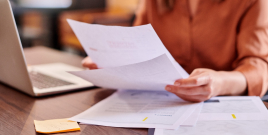- Introduction
- Steps to prepare
- Steps to recover
Are your finances ready if disaster strikes?
Read, 3 minutes
Hurricanes, wildfires, floods and other extreme weather can damage physical assets like your home or business, knocking your finances off course in the process. The fallout can be significant, but there are several steps you can take to shore up your finances ahead of—or after—a natural disaster to avoid long-term damage.
Steps to prepare
Determining what assets, like your home or other personal property, may be at risk is the first step in preparing for a potential loss. It’s also a good time to assess your home’s condition and whether there are upgrades—like replacing the roof or installing storm windows—you could make now to better protect it.
Article continues below
Related content
Store your critical financial documents in a safe, easy-to-access place in your home. For physical documents—things like birth certificates, Social Security cards, passports, insurance policies, mortgage or real estate deeds—consider placing them in a fire- and waterproof box. It also helps to digitize important records (make sure they are password protected) or keep a copy in another location, such as a safe deposit box or with a family member.
Unfortunately, lots of people don’t really read what is—and isn’t—covered by their insurance policies until they need them. Now is a good time to make sure you have adequate protection, and that you have paid your premiums to ensure you are fully covered. Assess whether there are gaps in your disaster coverage—damages caused by floods or earthquakes aren’t always covered by general policies.
Now is the perfect time to build or add onto an emergency fund. If you can’t return to work for an extended period or have repair costs that aren’t covered by insurance, you might need to dip into your savings or explore emergency cash options to help pay for things like everyday living expenses, disaster-related supplies and temporary lodging.
If you need to evacuate your home in a hurry, you’ll want some basic financial items on hand. Keep a small amount of money at home (preferably small bills). In addition to cash, you’ll also want to have your credit cards, checkbook, health insurance cards, insurance company contacts and personal identifications ready to go.
Steps to recover
After you’ve notified your insurance company, there are other resources to explore for immediate financial support. If you’re in a federally declared disaster area, you can apply for assistance Your state emergency management office also may have resources to help offer short-term financial help while you wait for insurance claims to be settled. And if your employment is interrupted or you lose your job because of the disaster, you may qualify for unemployment benefits.
Call your creditors The companies that manage your mortgage, auto loans, utilities, student loans and credit cards are likely to have policies to address customers impacted by natural disasters—especially if you work or live in a federally declared disaster area. Check that automatic payments are stopped for things like utilities that are no longer working.
Continue to check your credit report to ensure that emergency arrangements like forbearance or negotiated interest rate changes are not misreported as missed payments. Also, make sure you set up mail forwarding and update your financial institutions with your new address to avoid missing collection notices from any creditors trying to reach you.
Mobile Banking requires that you download the Mobile Banking app and may not be available for select mobile devices. Message and data rates may apply.
